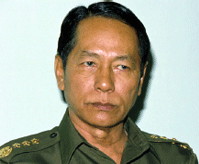Saw Maung
| Saw Maung စောမောင် |
|
|---|---|
 |
|
| Chairman of the State Law and Order Restoration Council | |
|
In office 18 September 1988 – 23 April 1992 |
|
| Vice President | General Than Shwe |
| Preceded by | Doctor Maung Maung (as President) |
| Succeeded by | Senior General Than Shwe |
| 7th Prime Minister of Burma | |
|
In office 21 September 1988 – 23 April 1992 |
|
| Preceded by | Tun Tin |
| Succeeded by | Senior General Than Shwe |
| Commander-in-Chief of the Armed Forces of Myanmar | |
|
In office 18 September 1988 – 23 April 1992 |
|
| Deputy | General Than Shwe |
| Preceded by | Chairmen Maung Maung |
| Succeeded by | Senior General Than Shwe |
| Personal details | |
| Born |
12 May 1928 Mandalay, Upper Burma, British India |
| Died | 24 July 1997 (aged 68) Yangon, Myanmar |
| Nationality | Burmese |
| Political party | SLORC |
| Spouse(s) | Daw Aye Yee |
| Children | Thiha Saw Kay Thi Saw Thura Saw |
| Residence | Yangon |
| Religion | Theravada Buddhism |
| Military service | |
| Service/branch | Myanmar Army |
| Years of service | 1946 - 1992 |
| Rank | Senior General |
Senior General Saw Maung (Burmese: စောမောင်, pronounced: [sɔ́ màʊɴ]; 12 May 1928 – 24 July 1997) was the founder of the State Law and Order Restoration Council, later renamed State Peace and Development Council in Myanmar. He served as chairman from 1988 to 1992.
He was born on 12 May 1928 in Mandalay, Upper Burma.
Saw Maung joined the army in 1946, two years before Burma gained independence from Britain, and received a commission in 1952. From 1975 to 1976, he fought against communist insurgents and ethnic rebels along the border with Thailand. In 1976, he became a brigadier general, and in 1981 an adjutant-general. He became armed forces commander in 1983.
Saw Maung was army chief of staff and defence minister in the brief government of Sein Lwin and became chairman of the junta when the army staged its coup in 1988 after the 8888 Uprising. He was effective ruler of the country as head of the State Law and Order Restoration Council (SLORC). He also held the posts of prime minister and foreign minister. As a high-ranking member of the Burma Socialist Programme Party (BSPP), he provided continuity of leadership during a succession of short-lived predecessors that followed the toppling of Ne Win earlier in 1988.
...
Wikipedia
